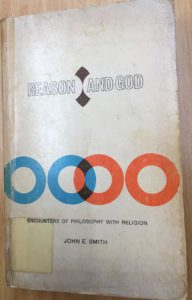
Philosophy and Religion– Seeking and Finding Truth
Religion is instituted by and continues to draw its life from the initial certainties arising from the experiences of its founders and heroes. Consequently, to proceed from the religious side means not so much the seeking after a truth yet undiscovered as the proclaiming of the meaning and importance of a truth already found. Philosophy, on the other hand, is born from wonder and from the quest of reason to find a pattern, a wisdom in things which is still to be disclosed. One side sets out from certainties; the other seeks to arrive at them. Viewed immediately, each side has its own distinctive and dominant character. This character, however, is not exhaustive; each side has within itself, as a kind of recessive element, the distinctive characteristic of the other, a similarity that becomes fully realized only when the two encounter each other; genuine encounter means that each enterprise is forced to a new level of self-consciousness. Religion discovers that its life is not exclusively a matter of certainties which exclude doubt and the rational quest; philosophy discovers that its life is not exclusively a search, because the rational quest itself must be carried out against a background of truths taken for granted and never fully justified in the course of any inquiry. Philosophy, moreover, comes to its own certainties when it comes to express its constructive results.
Religion becomes a stagnant lifeless affair if all doubt and questing are removed from it. In the encounter with philosophy the meaning of faith as a continual incorporation and overcoming of doubt is revealed. Philosophy, in turn, becomes a sterile formalism when it takes itself to be no more than a way of attacking problems, a method for conducting an inquiry. The encounter with religion forces an acknowledgement of the certainties which all philosophies harbour in themselves, even if their proponents claim that they have no fixed conclusions and are merely humble seekers after truth. No philosopher has been able to avoid assumptions and no one has ever succeeded in doubting everything consistently. The encounter of philosophy with religion shows, in short, that religion cannot be all finding and that philosophy cannot be all seeking.
Source: John Edwin Smith, Reason and God (Yale UP, 1961), pp. xiii-xiv.
John E. Smith was Professor of Philosophy at Yale University. He was a Unitarian.
Related Posts
Philosophy and Theology Reading 2/3: “Philosophy and Religion– Theology Judges the Conclusions of Philosophy” by Jacques Maritain.